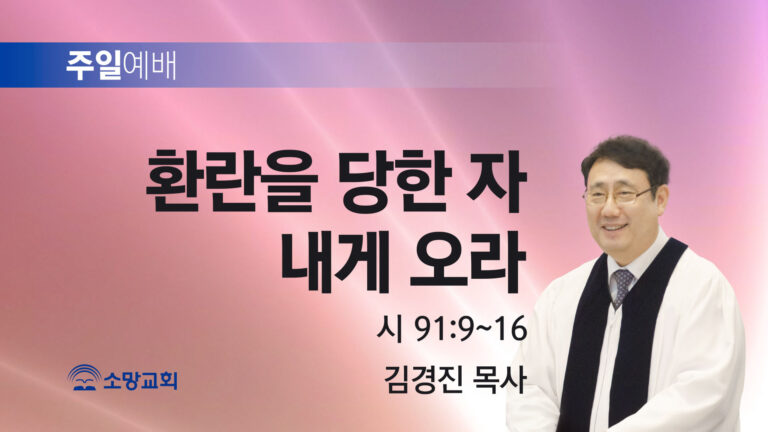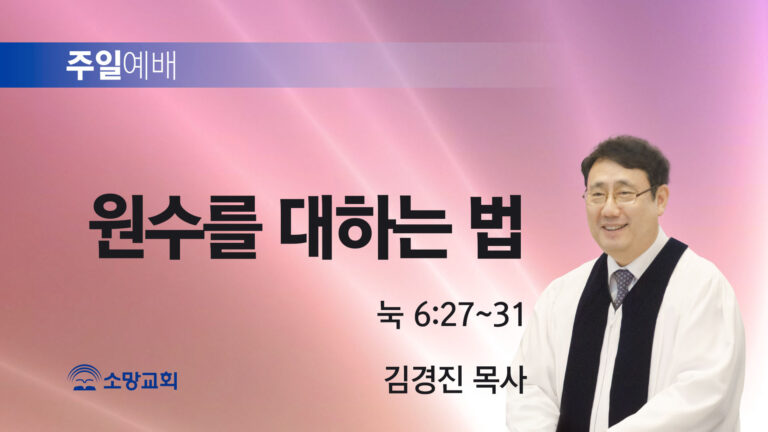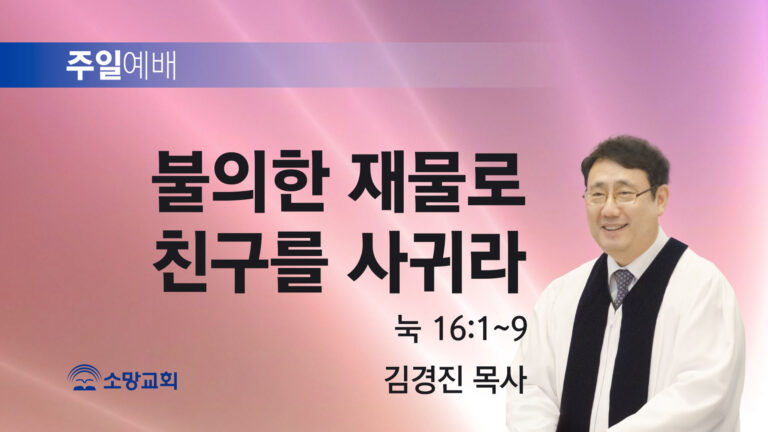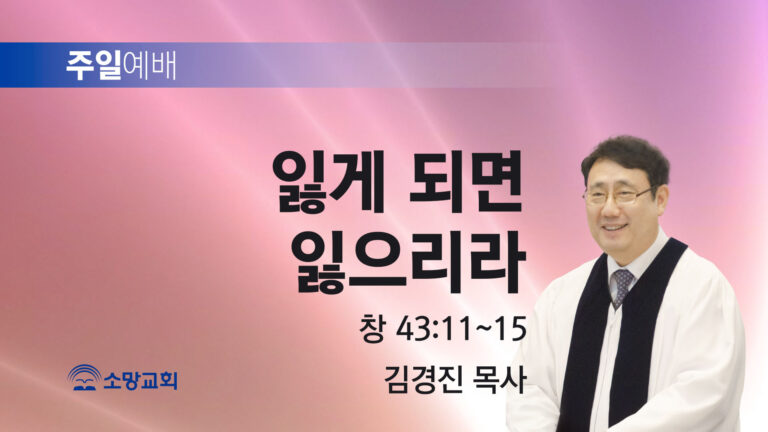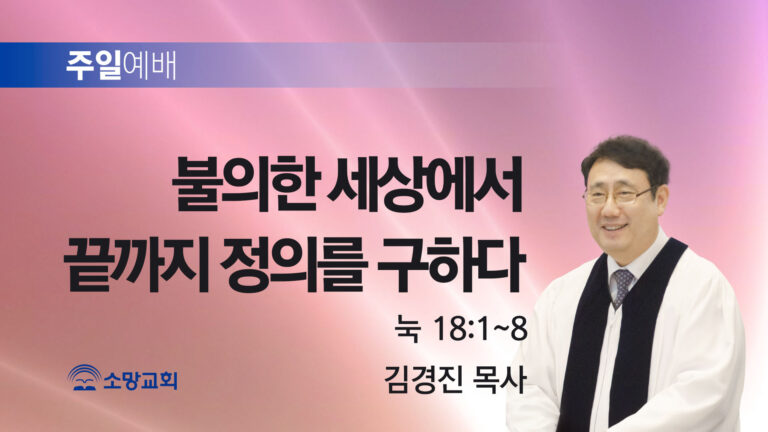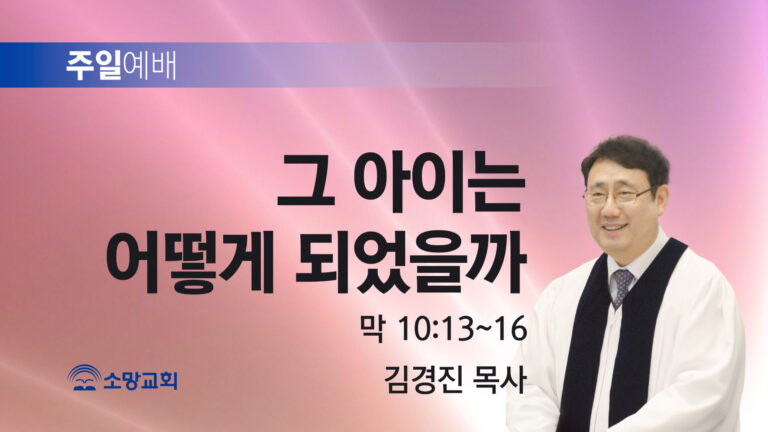설교
 구독 사용방법
구독 사용방법

좋은 땅의 조건
Conditions of the Good Soil
Luke 8:4-8
Today’s Scripture is a well-known parable told by Jesus. Not just Luke but all three Synoptic Gospels, including Matthew and Mark, record this parable.
In the Korean Revised Version, the translation that Koreans used formerly, the story was titled, “The Parable of the Sower,” but in the New Korean Revised Version (NKRV) the title was changed to “The Parable of the Seed that Fell on Four Soils.”
In fact, this story has long been read and interpreted from the perspective of the four types of soil, rather than from the viewpoint of the sower. In this sense, the NKRV’s new title is fitting and helps the readers to interpret the story properly.
When Jesus did His ministry—healing the sick, raising the dead, and forgiving sins—crowds flocked to Him. Jesus preached this parable to them, but its meaning was not wholly revealed to them:
“A farmer went out to sow his seed. As he was scattering the seed, some fell along the path; it was trampled on, and the birds ate it up. Some fell on rocky ground, and when it came up, the plants withered because they had no moisture. Other seed fell among thorns, which grew up with it and choked the plants. Still other seed fell on good soil. It came up and yielded a crop, a hundred times more than was sown.” (Luke 8:5-8 NIV)
What does it mean? Even the disciples were baffled, which is why they later asked Jesus the meaning of the parable.
Jesus answered them by providing an important framework for interpretation.
First, the seed is God’s Word. And the place where it fell—that is, along the path, on rocky ground, among thorns, and on good soil—represents the person who hears the Word. In other words, the four types of soil refer to four types of people who hear the Word of God. This is explained by our Lord in Luke 8:9-15, the passage that immediately follows today’s Scripture. Jesus kindly taught us how to understand and interpret the parable.
Consequently, whenever Christians read this parable, they resolve to become the good soil that yields a hundred times more than was sown. We all want to become the good soil.
Then how can we become the good soil? This is our first question. Can I turn myself into good soil? Or are people just born with it? Furthermore, if the good soil bears much fruit, what does that fruit look like in real life? At first sight, this parable seems easy, but the more we think about it the more questions we have.
Through this parable Jesus is teaching us a critical and comprehensive lesson on the Christian’s journey of faith. It is a precious lesson on coming to faith, continuing in faith, the result of pursuing faith, and the fruit gained by it.
In short, it teaches the whole journey of faith—how we first come to have faith, how we experience crises that threaten our faith, how we continue to have faith even in those trials, and how we finally bear the fruit of faith.
Now let’s return to the text and study the meaning of the good soil, the soil that we all strive to become. Jesus clearly defined the seed as the Word of God. He says, “Still other seed fell on good soil. It came up and yielded a crop, a hundred times more than was sown.” (Luke 8:8 NIV)
Then what kind of soil is the good soil? Jesus gives us His interpretation of it in Verse 15:
“But the seed on good soil stands for those with a noble and good heart, who hear the word, retain it, and by persevering produce a crop.” (Luke 8:15 NIV)
These words serve as an important criterion for defining “good soil.” What is good soil? In a word, it is a land that produces fruit. Good soil is a land where the seed grows, where the seed becomes a plant, and where the plant grows and bears fruit.
Then how does it bear fruit? Verse 15 describes the process of bearing fruit in three phases. In the original text, three Greek verbs describe the three-stage process. First, the phase of hearing the Word. Second, the phase of retaining it. Third, the phase of bearing fruit with patience.
Let’s consider each of these phases.
First, in the phase of hearing the Word, God’s Word is sown like the seed. His Word reaches everyone. The gospel is preached, and people hear the Word. Although this is the first phase of the good soil, it is also a phase common to all four types of soil. The gospel falls along the path, on rocky ground, and among thorns, too. And, of course, on good soil. In the NIV it says, “the good soil stands for those […] who hear the word.” Here the original Greek word for “hear” is “akouó (ἀκούω),” which means “to listen carefully.” When we study today’s text in the original language, we will find that “akouó” is used a whopping nine times, implying that it was used intentionally with a significance.
First, after speaking the parable, Jesus said, “Whoever has ears to hear, let them hear.” (Luke 8:8 NIV)
The verb “akouó” is repeated twice in this short sentence. Whoever can “hear (akouó)”, let them “hear (akouó).” In speaking this parable, Jesus implied that some are capable of hearing, while some are not.
Furthermore, this was Jesus’ reply when His disciples asked the meaning of the parable:
“The knowledge of the secrets of the kingdom of God has been given to you, but to others I speak in parables so that, ‘though seeing, they may not see; though hearing they may not understand.’” (Luke 8:10 NIV)
Again the Greek verb “akouó” is used.
The above verse tells us that Jesus spoke in parables so that those who cannot hear would not understand. Then Jesus unravels the meaning of the parable to His disciples. He is saying that there are those who cannot understand even though they hear.
In other words, not everyone comes to have faith, though everyone may hear. That we can hear and understand the Word of God is God’s grace. Faith begins with hearing the Word of God.
In today’s parable some of the seed fell along the path:
“Some fell along the path; it was trampled on, and the birds ate it up.” (Luke 8:5 NIV)
Such people are those who “hear” the word, but they don’t really hear it because the Word does not enter their hearts. Jesus explains their state as follows:
“[…] ones who hear, and then the devil comes and takes away the word from their hearts, so that they may not believe and be saved.” (Luke 8:12 NIV)
Then does this verse mean that there are people who are destined to never understand the Word even when they hear it? Does it mean that some are predestined to be saved, and the rest will never understand the Word no matter how hard they try?
To dispel such a misunderstanding, Jesus talks about a lamp on a stand at the end of today’s parable. Explaining how the hidden will eventually be disclosed and that there is nothing concealed that will not be brought out into the open, Jesus brings up hearing again:
“Therefore consider carefully how you listen. Whoever has will be given more; whoever does not have, even what they think they have will be taken from them.” (Luke 8:18 NIV)
This means that what is hidden is waiting to be revealed. In other words, the hidden Word of God is waiting to be disclosed. Therefore how may we hear? That is the question.
Jesus provides an answer by adding one condition to hearing in today’s parable:
“But the seed on good soil stands for those with a noble and good heart, who hear the word, retain it, and by persevering produce a crop.” (Luke 8:15a NIV)
The Greek words for “noble and good” in this verse are “kalos (καλός)” and “agathos (ἀγαθός)” respectively. When we receive the Word of God, we must have a good heart.
The one who receives the Word with an evil heart or a bad intention cannot approach God’s Word of truth. It is not God that prevents us from receiving the Word, but our attitude.
Therefore, when we hear the Word, we need two things. First, we must get as many opportunities as possible to read and hear the Word. We must try to scatter as many seeds as possible in our hearts.
Second, whenever we hear the Word, that is, whenever the seed is scattered, we must receive it with a good, noble, expectant, and positive heart. When we do this, the Holy Spirit opens our eyes and ears. The Word enters our heart and is retained.
The second phase of becoming the good soil is to retain the Word. This is the period from when the seed falls to the ground to the point that it continues to stay there. Good soil in itself does not have life. Soil is just soil. The life is in the seed. What the soil does is to keep the seed so that it will not die and sustain life.
This second phase is about retaining the seed. While the NIV translates this as “retain,” the NLT describes it as “cling to.” This phase is about guarding the Word in our hearts with faith. In this phase we don’t just hear the Word, but internalize it within our character and manifest it in our lives. The Greek word for retain (or cling to) is “katechó (κατέχω),” which means “to hold on tightly.”
In the parable Jesus introduces instances where the soil fails to retain the seed. The seed that fell on rocky ground withered because there was no moisture. The seed that fell among thorns also died because the thorns that grew alongside it choked it. Jesus unpacked the meaning of these two cases as follows:
“Those on the rocky ground are the ones who receive the word with joy when they hear it, but they have no root. They believe for a while, but in the time of testing they fall away. The seed that fell among the thorns stands for those who hear, but as they go on their way they are choked by life’s worries, riches and pleasures, and they do not mature.” (Luke 8:13-14 NIV)
This tells us that even when we receive God’s Word with joy and gratitude, the Word may not grow and the seed may die in some cases. In fact, this is a reality that Christians experience continuously.
When we hear the Word, sometimes God opens our ears and we receive it with delight. There are times when the Word enters and shakes our hearts. Many of you hearing this message today would have had such an experience. But, sometimes, the Word does not stay in our hearts. When trials come, worry steals the place of the Word in our hearts. Worry, instead of the Word, is retained. Desires also steal the place of the Word. The Word is not retained, but desire and greed rule our hearts. This is repeated in our lives.
Many people come to me and say, “Pastor, your message moves me.” This makes me happy. But not everyone who says this are God’s children who please Him. Receiving the Word with joy is important, but retaining it is even more important. The period of receiving and retaining the Word is critical.
Furthermore, the Bible mentions a third phase of becoming good soil: bearing fruit “with patience.” (T/N: While the NIV translates this as “by persevering,” the ESV says, “As for that in the good soil, they are those who, hearing the word, hold it fast in an honest and good heart, and bear fruit with patience.” (Luke 8:15 ESV)) The Greek word for “patience” is “hupomoné (ὑπομονή).” A long period of retaining the Word is needed. Patience is needed. The good soil is the person who retains the Word and endures with patience.
Fierce winds and storms may come. Floods may come. Heavy snow may fall. Pests may attack the plant and the soil. But as the soil withstands these trials day and night, the seed will grow into a plant, and the plant will eventually bear fruit.
This third phase is the period of withstanding trials, hardships, desires, worldly worries, and temptation. It is the period when the Word is revealed in our many life circumstances. It is the period when the Word ripens in our life.
Therefore, a critical condition of the good soil is patience. The person who retains the Word by persevering is the good soil. The one who clings to the Word and endures with patience, no matter the circumstances, is the one who bears fruit.
This is why our Lord says this to the believers in Colossus through Paul:
“In the same way, the gospel is bearing fruit and growing throughout the whole world—just as it has been doing among you since the day you heard it and truly understood God’s grace.”
(Colossians 1:6 NIV)
The Bible tells us that the gospel is being preached, is growing, and is bearing fruit. And who will see the gospel bear fruit in their lives?
The one who listens to the Word of God with a good and noble heart. The one who retains it. The one who clings to the Word with patience, no matter the circumstances. This is the man who will see the gospel bear fruit in his life.
Then what fruit may we expect? What do we gain as the fruit of the Word and as the fruit of our faith?
In Luke there is another instance where “patience” is used. We have seen it used in Luke 8:15. But patience also appears in Luke 21:19:
“In your patience possess ye your souls.” (Luke 21:19 KJV)
The Lexham English Bible translates this as follows:
“By your patient endurance you will gain your lives.” (Luke 21:19 LEB)
So what do we ultimately gain through the gospel? Through the Word? We gain our life, our soul—the most precious thing. We gain the life that world does not know and come to enjoy the kingdom of life.
When Jesus unpacked the meaning of today’s parable, this is what He said:
“The secret of the kingdom of God has been given to you. But to those on the outside everything is said in parables.” (Mark 4:11 NIV)
Jesus mentions “the secret of the kingdom of God.” He is implying that the fruit that we will bear is none other than the kingdom of God.
Where is true peace? What is true joy? When the Word of God grows within us and bears fruit and when we find life and joy in that fruit, the kingdom of God has come.
The secret to enjoying this is to hear the Word, to retain it, and to endure with patience. The fact that patience is required also means that peace, joy, and the kingdom of God are not gained in a single attempt.
Peace, joy, and the kingdom of God are fruits that are finally gained by enduring with patience and constantly trying. Receiving and hearing the Word daily with a good heart are more important than making haste. Living with that Word retained in our heart is critical. Guarding the Word and clinging to it with patience, no matter the trials and hardships that come our way, are important. Then when the time comes, we will see the fruit produced by the life of the gospel. We will reap truly beautiful and abundant fruit. Until then, dear brothers and sisters, do not be discouraged or despair and do your best to hear and keep the Word of God. This is what the Lord wants of us.
누가복음 8: 4~8
4~8
4 각 동네 사람들이 예수께로 나아와 큰 무리를 이루니 예수께서 비유로 말씀하시되
5 씨를 뿌리는 자가 그 씨를 뿌리러 나가서 뿌릴새 더러는 길 가에 떨어지매 밟히며 공중의 새들이 먹어버렸고
6 더러는 바위 위에 떨어지매 싹이 났다가 습기가 없으므로 말랐고
7 더러는 가시떨기 속에 떨어지매 가시가 함께 자라서 기운을 막았고
8 더러는 좋은 땅에 떨어지매 나서 백 배의 결실을 하였느니라 이 말씀을 하시고 외치시되 들을 귀 있는 자는 들을지어다
<본문의 비유 말씀은 신앙의 여정을 걷는 모두에게 필요한 교훈을 줍니다.>
예수께서 병자들을 고치시고 죽은 자를 살리시고, 또 죄를 사하시는 사역을 한창 하시는 중에 많은 무리들이 주님께로 나아왔습니다. 그러자 주님께서 그들에게 알 듯 모를 듯한 한 가지 비유 말씀을 전해 주십니다.
씨를 뿌리는 자가 그 씨를 뿌리러 나가서 뿌릴새 더러는 길 가에 떨어지매 밟히며 공중의 새들이 먹어버렸고 더러는 바위 위에 떨어지매 싹이 났다가 습기가 없으므로 말랐고 더러는 가시떨기 속에 떨어지매 가시가 함께 자라서 기운을 막았고 더러는 좋은 땅에 떨어지매 나서 백배의 결실을 하였느니라 (눅 8:5~8 중)
이 말씀을 들은 사람들은 어떤 느낌이었을까요? 아마도 말씀의 속뜻을 궁금해 하면서 다들 집으로 돌아갔을 겁니다. 후에 말씀의 뜻이 궁금했는지 제자들이 예수님께 따로 묻습니다. “예수님, 이 비유 말씀의 뜻이 무엇입니까?” 그때 주님께서는 이 비유를 해석하는 매우 중요한 틀을 가르쳐 주셨습니다. 우선 ‘씨’가 곧 ‘하나님의 말씀’이라고 말씀하셨습니다. 그리고는 길가, 바위, 가시떨기, 좁은 땅을 이야기하시며 말씀을 듣는 서로 다른 유형의 사람들을 알려 주셨습니다. 오늘 본문에 이은 8장 9~15절 말씀이 바로 그 내용입니다. 이렇듯 예수님은 비유를 자상하게 설명해 주시고 해석해 주셨습니다. 그래서 우리는 이 말씀을 읽을 때마다 말씀을 받고, 백배의 결실을 맺는 좋은 땅이 되어야겠다고 생각하곤 합니다. 우리 마음속에 늘 자리잡고 있는 로망이라고도 할 수 있겠습니다.
그렇다면 좋은 땅은 어떻게 될 수 있을까요? 우선 이런 질문이 앞섭니다. 좋은 땅은 내가 스스로 만들어 될 수 있는 땅인가 아니면, 운명적이고 생득적인 것일까? 하는 부분입니다. 이어서 질문이 따라옵니다. 말씀을 듣고 좋은 땅이 되어서 열매를 맺는다면 그 열매는 과연 무엇일까? 하는 점이죠. 언뜻 보면 쉬운 이야기 같지만 살피고 생각할수록 많은 의문이 생겨나는 말씀이 아닐 수 없습니다.
오늘 본문 말씀인 네 가지 땅에 떨어진 씨에 관한 예수님의 비유 말씀은 신앙인이 경험하는 신앙의 여정을 하나로 묶어 보여 주는 매우 중요한 말씀입니다. 매우 평범해 보이는 듯한 이 말씀 속에는 어떤 사람이 신앙을 갖게 되는지, 어떤 사람이 신앙을 계속 유지하며 나아가는지, 그리고 그 신앙을 가지고 나갈 때 얻게 되는 결과가 무엇인지를 알려 주는 귀한 본문입니다. 즉 처음 믿음을 갖게 되는 믿음의 출발부터, 믿음을 잃게 되는 위기, 그럼에도 믿음을 지키는 일과 마침내 믿음의 열매를 얻게 되는 일까지, 신앙인의 믿음의 여정을 우리에게 잘 보여 주고 있다고 할 수 있습니다. 그래서 어쩌면 오늘 말씀은 ‘내가 좀 더 나은 신앙인이 되어야겠다. 나의 삶에 변화가 좀 생기면 좋겠다.’라고 생각하신 분들이라면 주의 깊게 들으시고 마음에 새기셨으면 좋겠습니다.
<씨가 자라 열매 맺는 과정이 세 단계로 구분되며, 먼저는 ‘듣는’ 모습이 주목받습니다.>
자, 다시 본문으로 돌아가 봅니다. 우리가 꿈꾸는 좋은 땅에 대해서 한번 살펴보겠습니다. 좋은 땅이란 어떤 땅인가요? 자상하게도 예수님께서 이미 설명을 달아 주셨습니다. 15절 말씀입니다.
좋은 땅에 있다는 것은 착하고 좋은 마음으로 말씀을 듣고 지키어 인내로 결실하는 자니라 (눅 8:15)
아주 짧은 말씀으로 된 구절이지만 좋은 땅을 규정하는 데 매우 중요한 기준입니다. 좋은 땅이란 어떤 땅입니까? 한마디로 열매를 낼 수 있는 땅이라고 말씀하십니다. 좋은 땅이란 씨앗에서 싹이 나오고, 싹이 튼 다음에 나무가 되고, 나무에서 열매를 맺게 하는 땅, 바로 그런 땅이 좋은 땅이라고 하십니다. 그렇다면 열매는 어떻게 맺나요? 그 과정이 15절 말씀 가운데 세 단계로 나타나 있습니다. 원문은 세 개의 동사를 사용하면서 그 과정을 알려 줍니다.
첫 번째로는 말씀을 ‘듣는’ 단계입니다. 두 번째는 ‘지키는’ 단계입니다. 세 번째는 ‘결실’하는 단계입니다. 이 과정을 조금 더 깊이 살펴보겠습니다. 우선 첫 번째 단계인 말씀을 듣는 단계입니다. 하나님의 말씀이 씨앗처럼 뿌려집니다. 다시 말해 복음이 모든 사람에게 선포되고 전달됩니다. 그러면 그 말씀을 듣게 되는 사람들이 생겨납니다. 이 점이 좋은 땅의 첫 번째 조건이면서 동시에 네 가지 종류의 땅에 모두 해당되는 단계입니다. 복음은 길가에도 떨어지고, 바위 위에도 떨어지고, 가시떨기에도 떨어집니다. 물론 좋은 땅에도 떨어지죠. 이렇게 떨어지는 과정에서 본문은 한 가지 중요한 단어를 사용하는데 바로 ‘듣다’라는 동사입니다. 헬라어로는 ‘아코우오(ἀκούω, akouó)’ 라고 합니다. “듣다, 그리고 또 주의 깊게 듣는다”라는 뜻을 가지는 동사입니다.
본문을 원어로 주의 깊게 살펴보면 아코우오라는 단어가 9번이가 반복한다는 사실을 알게 됩니다. 의도적으로 사용되었습니다. 예수님께서 이 비유를 말씀하신 후에 마지막에 이런 말씀을 덧붙이셨습니다.
들을 귀 있는 자는 들을지어다 (눅 8:8 중)
심지어 이 짧은 문장 안에 ‘아코우오’ 라는 단어가 두 번이나 나옵니다. 하나는 ‘들을 귀’라는 표현에서 나오고, 다른 하나는 ‘들을지어다’에 사용됩니다. 이 비유 말씀을 하시면서 우리 주님은 비유를 들을 수 있는 사람과 들을 수 없는 사람이 있음을 암시하셨습니다. 다시 말씀드리면 주님의 말씀을 듣고 그 안에 안착되는 사람이 있는 반면에 그 말씀이 들리지 않는 사람을 구별하신 것입니다. 제자들이 비유의 뜻을 물었을 때도 주님은 이렇게 대답하십니다.
이르시되 하나님 나라의 비밀을 아는 것이 너희에게는 허락되었으나 다른 사람에게는 비유로 하나니 이는 그들로 보아도 보지 못하고 들어도 깨닫지 못하게 하려 함이라 (눅 8:10)
여기에서도 ‘아코우오’ 단어가 또 사용되고 있습니다. 그러고 나서 주님은 제자들에게 비유를 풀어 주셨습니다. 듣지만 듣지 못하는 사람들이 있고, 들은 후에야 말씀의 뜻을 깨닫는 사람들이 있었음을 분명하게 보여 주신 것입니다.
이 말씀은 우리가 복음을 듣는다고 해서 모두 다 믿음으로 나아가는 것이 아니라는 사실을 알려 줍니다. 더 나아가서 들리는 것 자체가, 하나님의 말씀이 들려오는 것 자체가 이미 은혜라는 사실을 알려 줍니다. 주님의 말씀이 들려오는 그 순간에 신앙은 이미 시작됩니다. 신앙의 출발점이라고도 할 수 있겠습니다. 본문 속 비유에는 길가에 떨어진 씨앗이 나옵니다.
길가에 떨어지매 밟히며 공중의 새들이 먹어 버렸고 (눅 8:5 중)
말씀은 듣지만 그 말씀이 실제로 들리지는 않는, 마음까지는 다가오지 않는 상태를 가리킵니다. 그러한 상태를 두고 주님께서는 “마귀가 가서 그들이 믿어 구원을 얻지 못하게 하려고 말씀을 그 마음에서 빼앗는 것이다.”라고 말씀해 주셨습니다.
그렇다면 들어도 듣지 못하는 운명을 타고난 사람이 있다는 의미일까요? 특별히 구원받도록 예정된 사람이 있어서 어떤 사람은 들어도 도저히 이해할 수 없단 뜻이겠습니까? 이 오해를 풀고자 주님은 비유의 말미에 등경 위에 둔 등불에 대해 말씀하십니다. 숨은 것은 결국 다 드러나게 되고, 감추인 것 중에서 나타나지 않을 것이 없다고 가르쳐 주신 것입니다.
그러므로 너희가 어떻게 들을까 스스로 삼가라 누구든지 있는 자는 받겠고 없는 자는 그 있는 줄로 아는 것까지도 빼앗기리라 하시니라 (눅 8:18)
여기서도 역시나 ‘아코우오’라는 단어가 등장합니다. 다시 말해 하나님의 감추어진 말씀은 영원히 감추어진 게 아니라 드러나기를 고대하면서 그것을 발견할 사람을 찾고 있다는 것입니다. 그러므로 중요한 것은 막혀 있는 문제가 아니라, 말씀을 어떻게 듣느냐에 관한 부분입니다. 주님께서 비밀스럽게 비유로 닫아 두셨지만 찾는 자는 찾을 것이고 구하는 자는 얻을 것입니다. 말씀을 듣기 원하는 사람은 그 말씀을 듣게 될 것입니다.
그래서 주님께서는 ‘듣는다’라는 말 앞에 수식어를 붙여 주셨습니다. 좋은 땅에 있다는 것은 착하고 좋은 마음으로 말씀을 듣는 자세여야 한다는 것입니다. 이곳에 사용된 ‘착하고 좋은’이라는 말은 원어로 모두 ‘좋다’는 뜻을 가집니다. 하나님의 말씀을 받는 자세는 좋은 마음이어야 한다는 뜻입니다. 악한 마음, 악한 의도로 말씀을 받는 사람은 참다운 하나님의 말씀에 다가갈 수 없습니다. 하나님께서 막으시는 게 아니라 우리 태도가 말씀의 들음을 막는 것입니다. 사적인 목적으로 말씀을 받는 것, 욕심과 욕정으로 말씀을 받는 것은 진정 말씀을 듣는 자세가 아닙니다. 착한 마음과 진실한 마음으로 하나님께 나아갈 때 하나님께서는 그 말씀을 들을 수 있도록 열어 주십니다.
그러므로 말씀을 들을 때 두 가지가 필요합니다. 첫 번째로는 말씀을 듣고 읽는 기회를 가능한 많이 하는 것입니다. 주님의 말씀이 씨앗이라고 했습니다. 씨앗은 생명이 있습니다. 그 씨앗을 우리가 많이 받는 것, 우리 안에 많이 두는 것, 그 말씀이 내 안에 들어와서 나를 바꿀 수 있도록 하는 것, 이것이 필요합니다. 말씀의 씨앗이 많이 뿌려지도록 노력해야 합니다. 이것이 우리가 해야 할 첫 번째 일입니다. 두 번째로는 말씀을 들을 때마다 씨가 뿌려질 때마다 기대하는 마음, 좋은 마음, 착한 마음, 긍정의 마음으로 말씀을 받아야 합니다. 그리고 그렇게 말씀을 읽고 들을 때 성령께서 우리의 눈을 열어 주시고 귀를 열어 주십니다. 그때서야 말씀이 들려오고 그 말씀이 나의 안에 머물게 됩니다.
<듣고도 지키지 않으면 싹이 나기 어렵고, 지켜도 포기하면 열매는 열리지 않습니다.>
좋은 땅의 두 번째 단계는 지키는 단계입니다. 땅에 떨어진 씨앗이 그 안에 머무는 시간이 필요합니다. 사실 우리는 좋은 땅이라고 하면 상태를 주로 생각하지만 주님께서 말씀하시는 좋은 땅에는 시간의 의미가 담겨 있습니다. 좋은 땅은 그 자체로 생명력이 있지는 않습니다. 생명은 씨앗 안에 존재합니다. 씨앗이 죽지 않고 생명력을 유지하면서 그곳에 머물도록 하는 일이 좋은 땅이 하는 일입니다. 상태가 좋아도 씨앗이 없다면 절대로 생명이 나올 수 없습니다. 그러나 상태가 조금 나빠도 씨앗이 땅에 있으면, 씨앗에서 싹이 나오고 자랄 수만 있다면, 그 땅은 좋은 땅이 되는 것입니다. 그래서 새번역은 말씀을 굳게 간직하라고 번역합니다. 말씀이 우리 마음속에 확신으로 머무는 단계를 의미합니다.
원어로 ‘카테코(κατέχω, katechó)’는 ‘단단히 붙잡다’는 뜻을 가지고 있습니다. 이 비유 속에는 말씀을 단단히 붙잡지 못해서 실패한 경우가 나타납니다. 바위에 떨어진 씨앗이 그렇고, 가시떨기에 떨어진 씨앗이 그러했습니다. 그들은 함께 자라나는 듯했지만 결국 싹을 틔우지 못하고 죽고 말았습니다. 예수님께서 이 두 경우를 영적으로 이렇게 해석해 주셨습니다.
바위 위에 있다는 것은 말씀을 들을 때에 기쁨으로 받으나 뿌리가 없어 잠깐 믿다가 시련을 당할 때에 배반하는 자요 가시떨기에 떨어졌다는 것은 말씀을 들은 자이나 지내는 중 이생의 염려와 재물과 향락에 기운이 막혀 온전히 결실하지 못하는 자요 (눅 8:13~14)
이 말씀은 감동과 감격으로 하나님의 말씀을 받더라도 결국엔 사라져 버릴 수 있다는 사실을 알려 줍니다. 우리 안에서 반복적으로 경험하고 있는 삶의 형태라고도 말할 수 있겠습니다. 우리는 이 말씀을 들을 때 하나님이 열어 주시는 귀를 통해서 달게 받을 때가 있습니다. 우리의 마음을 흔들어놓는 말씀이 참 많습니다. 사실은 이것이 은혜입니다.
그런데 그 말씀이 내 안에 머물러 있지를 못합니다. 어려운 일이 있을 때 도리어 그 자리에 근심이 들어가서 말씀의 자리를 빼앗고 맙니다. 말씀이 머물지 못하고, 걱정이 그 자리를 차지합니다. 욕망이 들어가서 말씀의 자리를 빼앗습니다. 말씀이 머물지 못하고 욕정과 욕망의 지배를 받게 됩니다. 우리는 늘 이런 일을 반복하고 경험하며 살아갑니다. 말씀이 자라날 수 있는 환경을 만드는 것, 이것이 좋은 땅이 해야 하는 일입니다. 한 가지 작은 구절의 말씀이라도 좋습니다. 나의 삶을 이끌어 갈 수 있는 말씀이 마음속에 머물고 그 말씀이 나를 주장하고 인도하는 경험, 때로는 나를 책망하기도 하는 말씀이 우리 안에 있을 때 말씀이 자라나는 것을 보게 됩니다.
한 걸음 더 나아가서 성경은 세 번째로 ‘인내’라는 표현을 씁니다. ‘휘포모네(ὑπομονή, hupomoné)’ 라는 단어가 사용되고 있죠. 인내로 결실하는 단계를 말합니다. 인내가 필요하다는 뜻입니다. 때로는 광풍이 불고 바람이 불고 비가 내리고 눈이 내립니다. 우리의 영혼에 그와 같은 일들이 계속해서 일어납니다. 병충해가 땅과 나무를 갉아 먹는 듯한 시간을 겪기도 합니다. 천둥과 번개 치는 시간을 거치기도 합니다. 낮도 있지만 밤도 있습니다. 그럼에도 땅속의 씨앗은 나무를 내고 나무는 열매를 냅니다. 말씀이 여러 상황에서 삶으로 구현되는 단계입니다. 말씀이 삶 속에서 익어 가는 것입니다. 그러므로 좋은 땅은 말씀을 품고 인내하는 사람을 말합니다. 말씀에 싹이 나고 열매가 열릴 때까지 오래 참으며 말씀을 붙잡고 살아가는 사람, 환란을 당하든 기쁜 일이 있든 그 말씀 붙잡고 살아가는 사람이 바로 좋은 땅이 되는 것입니다. 그러므로 하나님께서는 골로새서를 통해 이렇게 말씀하십니다.
이 복음은 온 세상에 전해진 것과 같이, 여러분에게 전해졌습니다. 여러분이 하나님의 은혜를 듣고서 참되게 깨달은 그날로부터, 여러분 가운데서와 같이 온 세상에서 열매를 맺으며 자라고 있습니다. (골 1:6, 새번역)
바울은 골로새 교인들 속에서 이미 자라나고 있는 열매를 보고 있었습니다. 다시 한번 정리해 봅니다. 어떤 사람에게 말씀의 열매가 열립니까? 착하고 좋은 마음으로 말씀에 귀를 기울이는 사람, 그 말씀이 마음에 머물러 있도록 하는 사람, 어떠한 환경에서든지 하나님의 말씀을 인내함으로 붙잡고 살아가는 사람, 바로 그 사람에게 말씀의 열매가 열립니다. 바로 그 사람이 좋은 땅입니다.
<세 단계를 통과하며 나아가는 자가 하나님 나라의 생명으로 충만해집니다.>
그렇다면 우리가 좋은 땅을 통하여 기대하는 열매는 무엇입니까? 신앙생활의 열매, 말씀을 받고 그 말씀을 통하여 열매로 얻게 되는 것은 과연 무엇일까요? 부귀와 영화이겠습니까? 성공일까요? 과연 우리는 무엇을 바라며 말씀을 붙잡고 인내하며 살아가고 있습니까?
누가복음 말씀에는 ‘휘포모네(ὑπομονή, hupomoné)’ 곧 ‘인내’라는 단어가 두 번 나옵니다. 한 곳은 조금 전 말씀드린 누가복음 8장 15절이고, 다른 한 곳은 누가복음 21장입니다. 그곳에서 인내라는 단어가 이렇게 사용됩니다.
너희의 인내로 너희 영혼을 얻으리라 (눅 21:19)
공동번역은 이렇게 번역합니다.
그리고 참고 견디면 생명을 얻을 것이다. (눅 21:19, 공동번역개정판)
그렇습니다, 여러분. 우리 안에 들어온 말씀, 이 생명은 세상이 갖지 못한 것이죠. 세상이 갖지 못한 생명이 우리 안에 담겨지고, 말씀이 자라나서 열매가 열리며 참 생명을 누리게 되는 것입니다. 이 비유를 해석하여 주실 때 예수님은 이렇게도 말씀하셨습니다.
이르시되 하나님 나라의 비밀을 너희에게는 주었으나 외인에게는 모든 것을 비유로 하나니 (막 4:11)
이 말씀 속에 ‘하나님 나라의 비밀’이라는 표현이 나옵니다. 즉 우리가 얻게 되는 열매는 바로 하나님 나라라는 암시입니다. 하나님께서 하나님 나라의 비밀을 외인들에게는 감추어 두셨지만 말씀 속에는 열어 두셨고, 그것을 발견하게 해 주셨습니다. 그 말씀을 통해서 우리가 하나님 나라를 발견하게 되고 성취하게 될 것입니다.
참된 평화가 어디에 있습니까? 참된 기쁨이 어디 있나요? 주님의 말씀이 내 안에 자라서 열매를 맺을 때, 그 열매 가운데 생명이 있고, 기쁨이 있고, 하나님 나라가 임하는 것입니다. 참된 평화가 오고 세상이 주지 못하는 참된 안식이 주어지는 것입니다. 이것을 누리는 비결은 말씀을 듣고, 그 말씀을 품고 인내하는 길입니다.
인내가 필요하다는 말씀은 우리에게 평화나 기쁨이나 하나님의 나라가 단번에 주어지는 것이 아니라는 의미이기도 합니다. 평안과 평화, 기쁨과 하나님의 나라는 우리가 가꾸어 감으로 우리 안에서 점차 실현되고 만들어지고 나타나는 나라입니다. 조급하게 서두르지 않고 말씀을 지켜내며, 시련과 어려움 속에서도 말씀을 놓지 않고 기다리는 것. 이것이 우리가 해야 할 일입니다. 바로 좋은 땅의 비밀입니다.
사랑하는 성도 여러분, 실망하거나 낙심하지 말고 주님의 말씀을 오늘도 굳게 잡으십시다. 이 말씀이 내 안에서 발현되기를 끊임없이 소망하십시다. 우리 주님께서 우리를 향하여 원하고 계십니다. 함께 기도하겠습니다.
2022년 9월 18일 주일 구역(가정)예배자료 “좋은 땅의 조건” (눅 8:4-8)
⑴ 사도신경으로 신앙을 고백합니다. ⑵ 찬송가 528장, 449장을 부릅니다.
⑶ 구역식구(가족) 중 한 분이 기도합니다. ⑷ 눅 8:4-8절을 읽고 나눕니다.
⑸ 기도제목을 나누고 기도합니다. ⑹ 마무리 기도와 주기도로 구역예배를 마칩니다.
〈인터넷 참조〉 http://www.somang.net으로 접속, 9월 18일자 주일예배 말씀
생각하기
‘네 가지 땅에 떨어진 씨 비유’는 우리에게 너무나 잘 알려진 예수님의 비유입니다. 그런데 우리는 이 말씀을 읽을 때마다 우리가 ‘좋은 땅’과 같은 마음의 밭을 가졌는지 되묻게 됩니다. 우리는 스스로 좋은 땅이 될 수 있을까요? 아니면 좋은 땅이란 그저 운명적이고 생득적인 것일까요? 그리고 말씀을 듣고 좋은 땅이 되어 열매를 맺는다면, 그 열매는 과연 무엇일까요?
설교의 요약
주님은 씨가 ‘하나님의 말씀’이라고 분명히 정의해주셨습니다. 그렇다면 좋은 땅이란 무엇일까요? 좋은 땅이라는 것은 ‘열매를 내는 땅’입니다. 15절 말씀을 보면 열매를 맺는 과정이 세 단계로 나와 있습니다. 먼저는 말씀을 듣는 단계이며, 두 번째는 지키는 단계이고, 마지막으로는 결실하는 단계입니다.
먼저 듣는 단계란 하나님의 말씀이 마치 씨앗처럼 뿌려지는 단계입니다. 여기에서 듣다라는 그리스어는 ‘아쿠오’인데, 이 단어는 본문에서만 9번이나 반복되고 있습니다. 주님은 ‘귀 있는 자는 들으라’고 말씀하십니다. 즉 하나님의 말씀은 듣는다고 모두 다 믿음으로 나아가는 것이 아닙니다. 들리는 것 자체가 하나님의 은혜입니다. 하나님 말씀이 들리는 사람들은 모두 ‘착하고 좋은 마음으로 말씀을 듣습니다.’ 즉 가능한 말씀을 듣고 읽을 기회를 가지고, 또한 기대하는 마음, 착하고 긍정적인 마음으로 말씀을 받아야 한다는 것입니다.
두 번째 단계는 지키는 단계입니다. 이것은 말씀이 우리 마음 속에 확신으로 머무는 단계를 뜻합니다. 말씀을 들을 때는 기쁘고 은혜롭게 들을 수 있습니다. 그러나 그 말씀이 내 안에 머무르지 못하는 이유가 무엇입니까? 그것은 고난이 닥칠 때 근심으로 인해, 걱정으로 인해 또는 욕심과 욕망이 마음을 지배하기 때문입니다. 말씀이 우리 안에 들어와 내면화되어야 합니다. 원어로는 ‘카테코’라고 하는데, 이는 말씀을 단단히 붙잡는다는 뜻입니다.
마지막으로 하나님의 말씀이 우리 안에 들어와 인내로 결실하는 단계, 즉 말씀이 머무는 긴 시간이 중요합니다. 환란과 시련을 견디고, 욕심을 견디고, 세상의 염려를 견디고, 유혹을 견디며 시간을 채워야 하는 단계입니다. 이는 말씀이 여러 상황에서 삶으로 구현되는 단계입니다. 말씀이 삶 속에서 익어가는 것입니다. 그러므로 좋은 땅의 매우 중요한 조건은 인내하는 것입니다. 말씀을 품고 인내하는 사람이 좋은 땅입니다.
착하고 좋은 마음으로 말씀에 귀를 기울이는 사람. 그 말씀이 마음에 머물도록 하는 사람. 그리고 어떠한 환경에서든지 하나님의 말씀을 인내함으로 붙잡고 살아가는 사람. 바로 그 사람에게 말씀의 열매가 열리게 됩니다. 그리고 그 열매는 바로 하나님의 나라, 이 세상이 갖지 못한 생명의 나라입니다.
나누기
1. 좋은 밭의 3단계(기쁨, 내면화, 인내) 중 특히 나에게 필요한 단계는 무엇인가요?
2. 지금 내가 붙잡고 있는 말씀, 기쁨으로 듣고, 마음 속에 지키며, 인내하고 있는 말씀은 무엇인가요?
마무리기도
주님, 우리가 착하고 좋은 마음으로 말씀을 듣게 하시고, 들은 말씀을 마음에 새기며, 그 말씀이 싹이 나고 열매로 자라게 하옵소서. 예수 그리스도의 이름으로 기도드립니다. 아멘.









